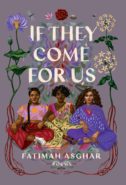
Review: If They Come for Us by Fatimah Asghar
Reviewed by Ronnie K. Stephens

If They Come for Us
Poems by Fatimah Asghar
One World, Random House Imprint, August 2018
$16.00, 128 pp.
ISBN-13: 978-0525509783
Fatimah Asghar redefines poetry in her full-length debut collection, If They Come for Us, which interweaves free verse and innovative forms as she explores what it means to be orphan, to be immigrant, to be human. Asghar has a strong reputation for challenging norms, and for intelligent, sharp writing. She recently received an Emmy nomination for Brown Girls, a web series centering on friendships between women of color. While on a Fulbright studying theater in post-genocidal countries, Asghar also founded a spoken word group in Bosnia and Herzegovina called REFLEKS.
If They Come for Us is a keen, successful example of experimental form in contemporary poetry. Asghar orchestrates a complex narrative across a standard bingo card in “Microagression Bingo,” while critiquing the stock language used by colonialist countries by employing a mad-lib form in “August 15th, 1947.” Asghar brilliantly navigates the use of space and shape on the page by turning “Map Home” into a crossword puzzle. In “Script for Child Services: A Floor Plan,” she comments on the foster care system by overlaying the text of the poem onto each room of the floorplan for a home. The words “Repeat after me: he is not a monster. Nothing happened. She isn’t feeling well right now. That’s why she called,” appear over and over in a continuous block of text beneath the floorplan, acting as a backdrop for the poem as a whole. These haunting words create a ghostly echo against the backdrop of the trauma described in the poem. But Asghar is not bound by her explorations of form; she expertly writes in numerous traditional forms, utilizing couplets and tercets as effectively as she does long, narrative stanzas.
While her approach to form is enough to make this collection a fixture in classrooms and workshops, Asghar is equally precise with words. In “For Peshwar,” she indicts:
In all our family histories, one wrong
turn & then, death…
…
The dirge, our hearts, pounds vicious, as we prepare
the white linen, ready to wrap our bodies.
The language around death and the inevitability of burying more bodies is eerie in its frankness, conveying how easily violent oppression is internalized. “Gazebo” bridges this acceptance that death is a part of daily life with the strength it takes to survive in such spaces, as the speaker proclaims, “We had too many funerals to waste / flowers. But we loved our story: the gazebo / that dared to live on concrete.”
Strength and resilience are pervasive themes throughout the collection. “To Prevent Hypothermia” uses tercets with short lines to mirror the confines of the bus that is the setting of the narrative. The poem celebrates the collective strength of women, recounting a moment when the speaker’s teammates throw their male counterparts off the bus and surround her freezing body, working to warm her after a race. In “Other Body,” the speaker addresses her dead mother:
…Sometimes I laugh
alone & for a moment forget
I was talking to you. Sometimes
I let my grief go & my body is fully mine.
These lines highlight the necessity to hold moments of joy despite the hard, lingering grip of trauma; they also address being an orphan, a thread that carries through the collection.
As an orphan and an immigrant herself, it comes as no surprise that Asghar is at her best in poems that explore what it means to navigate various spaces. Most often, these poems discuss the body as political. Asghar most directly breaks down the various labels assigned and unassigned to her body in a section of “Partition:” “you’re muslim until you’re not a virgin. you’re pakistani until they start throwing acid. you’re muslim until it’s too dangerous. you’re safe until you’re alone. you’re american until the towers fall. until there’s a border on your back.”
This sentiment carries through to “Oil,” in which the speaker laments, “All the people I could be are dangerous. / The blood clotting, oil in my veins.” One of the most eerie poems, “They Asked for a Map,” describes the aftermath of Partition in South Asia in a remarkable use of parallelism:
they asked for a map
& so I drew a line
down the army, down the police
down the guns & the bayonets.
cousins partitioned from cousins,
mothers partitioned from child,
neighbors spearing neighbors,
women, virgins, jumping into wells
so full with people they can’t
find water to drown.
Ultimately, Asghar’s words are poignant and immediate, echoing days after each reading. If They Come for Us is one of the most unique collections in American poetry, consistently blending familiar techniques with hybrid forms and plays on tradition as it navigates vital conversations about identity politics. I genuinely believe that Asghar has written what will prove to be the origin point of a new American poetry. As an educator, a reader, and a writer, this is has quickly become a collection that I will return to for decades.
Ronnie K. Stephens is a full-time educator and father of five, with a strong interest in poetry, fiction, and activism. He recently completed an MA in Creative Writing and an MFA in Fiction at Wilkes University. During his time at Wilkes, he was awarded two scholarships and won the Etruscan Press Prize. Stephens has published two full-length poetry collections, Universe in the Key of Matryoshka and They Rewrote Themselves Legendary, with Timber Mouse Publishing out of Austin. His first novel, The Kaleidoscope Sisters, was released August 2018.

Leave a Reply